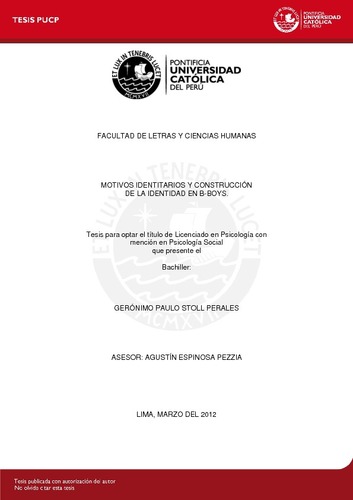| dc.contributor.advisor | Espinosa Pezzia, Agustín | es_ES |
| dc.contributor.author | Stoll Perales, Gerónimo Paulo | es_ES |
| dc.date.accessioned | 2013-09-12T15:52:21Z | es_ES |
| dc.date.available | 2013-09-12T15:52:21Z | es_ES |
| dc.date.created | 2012 | es_ES |
| dc.date.issued | 2013-09-12 | es_ES |
| dc.identifier.uri | http://hdl.handle.net/20.500.12404/4761 | |
| dc.description.abstract | La Teoría de los Motivos de la Identidad postula que las personas buscan construir
una identidad que permita satisfacer los motivos de autoestima, auto-eficacia,
pertenencia, distintividad, continuidad y significado. Las personas varían en la forma
que buscan satisfacer cada motivo, ya que otorgan diferente peso e importancia a
cada uno de estos. Mediante una aproximación metodológica cualitativa, se exploró
como dichos motivos se articulan y permiten la construcción de una identidad en
cultores de Break Dance, conocidos como B-Boys, buscando describir la categoría BBoy
así como observar si dicha identidad involucra abstenerse del pandillaje y
consumo de sustancias psicoactivas. Se observó que la identidad B-Boy satisface
cada uno de los motivos identitarios, en donde tanto el motivo de auto-eficacia como
de autoestima se refuerzan mutuamente, el motivo de pertenencia regula el de
autoestima así como se complementa con el de distintividad, mientras que el motivo
de continuidad se observa a lo largo de una narrativa coherente en las historias de
vida relatadas, así como intentos de búsqueda de estabilidad de la identidad a través
del tiempo. Finalmente el motivo de significado se desprende de las distintas
experiencias significativas que ha otorgado la satisfacción del resto de motivos. Con
respecto al pandillaje y consumo de sustancias psicoactivas, el break dance resulta
una suerte de contexto protector frente al primero mas no del segundo, actuando mas
bien como regulador del uso de sustancias psicoactivas dada las exigencias de
moderación frente a las cuales deben atenerse sus cultores con miras a su progreso
como bailarines. | es_ES |
| dc.description.abstract | The Identity Motives Theory claims that people seek to build an identity that satisfies
the motives of self-esteem, self-efficacy, belonging, distinctiveness and meaning.
People vary in the way they seek to satisfy each motive, due to the fact that they bring
different weight and importance to each motive. By an a qualitative methodology
approach, this work explores how these motives articulate and allow the construction of
an identity in Break Dance exponents, known as B-Boys; seeks to describe the
category B-Boy and by the same time, observe if such identity involves an abstinence
of participation in gangs and the use of psychoactive substances. It was found that the
identity B-Boy satisfied each of the identity motives, seeing that the motives of selfesteem
and self-efficacy reinforce it reciprocally, the belonging motive regulates the
self-esteem motive and also complements with the distinctiveness motive, while the
continuity motive observes through a coherence between the narrative histories
reported, and also through attempts of searching for stability in the identity across the
time. Finally, the motive of meaning comes from the different significant experiences
that have been brought by the satisfaction of the others motives. Related to the gangs
and use of psychoactive substances, break dance results in a sort of protective context
for the first but not the second, acting instead as a regulator of the use of substances
due to the moderation exigencies that their exponents must attain if they seek to
progress as dancers. | es_ES |
| dc.language.iso | spa | es_ES |
| dc.publisher | Pontificia Universidad Católica del Perú | es_ES |
| dc.rights | Atribución-NoComercial-SinDerivadas 2.5 Perú | * |
| dc.rights | info:eu-repo/semantics/openAccess | es_ES |
| dc.rights.uri | http://creativecommons.org/licenses/by-nc-nd/2.5/pe/ | * |
| dc.subject | Motivación (Psicología) | es_ES |
| dc.subject | Identidad--Aspectos sociales | es_ES |
| dc.subject | Identidad social | es_ES |
| dc.subject | Pandillas | es_ES |
| dc.subject | Drogas | es_ES |
| dc.title | Motivos identitarios y construcción de la identidad en B-Boys | es_ES |
| dc.type | info:eu-repo/semantics/bachelorThesis | es_ES |
| thesis.degree.name | Licenciado en Psicología Social | es_ES |
| thesis.degree.level | Título Profesional | es_ES |
| thesis.degree.grantor | Pontificia Universidad Católica del Perú. Facultad de Letras y Ciencias Humanas. | es_ES |
| thesis.degree.discipline | Psicología Social | es_ES |
| renati.discipline | 313066 | es_ES |
| renati.level | https://purl.org/pe-repo/renati/level#tituloProfesional | es_ES |
| renati.type | http://purl.org/pe-repo/renati/type#tesis | es_ES |
| dc.publisher.country | PE | es_ES |
| dc.subject.ocde | http://purl.org/pe-repo/ocde/ford#5.01.00 | es_ES |






